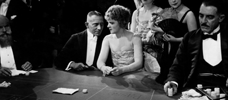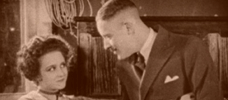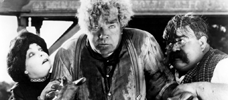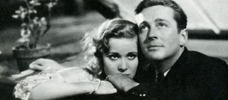Reviews
Erich von Stroheim
USA, 1928
Credits
Review by Cullen Gallagher
Posted on 31 August 2009
Source 35mm print
Categories The Silence After Sound: Hollywood’s Last Silent Movies
Oh, the Depravity! The Cinema of Erich von StroheimThe opening credits to The Wedding March list the film as an Erich von Stroheim production, starring Erich von Stroheim, and written Erich von Stroheim with Harry Carr. And, in case you didn’t get the message, this is followed by another title-card that proclaims, “In its entirety an Erich von Stroheim creation.” Nor is that last you’ll read of his name. The Wedding March also carries an inscription: “Dedicated to the true lovers of the world.” Guess whose initials grace the bottom of that address.
It’s worth pausing a minute to consider the audacity of this title sequence for a couple of reasons. There’s a bluntness to the credits, and particularly the dedication, that will continue throughout the movie. The Wedding March manages to beat you over the head with its themes, but still come off as sensitively subtle. Such is the contradiction of von Stroheim. Foremost, however, is the notion of authorship, something that von Stroheim is loudly proclaiming. One can almost see him banging fists on the table declaring that the film is his and no one else’s. The tension between a personal “work of art” and commercial “product” is frequently felt in Hollywood productions—nor are they necessarily mutually exclusive, as many a Hollywood professional was able to churn out genre products that were great hits but also bore identifiable, singular characteristics. Von Stroheim, however, notoriously refused to walk this fine line: he didn’t work for Hollywood, Hollywood worked for him. This attitude would lead to the 9-hour Greed (which studio hands decimated to a paltry two hours) and the ultimately unfinished Queen Kelly, whose production costs ballooned until they finally burst. Clocking in at just under two hours, The Wedding March seems comparatively tame. However, a companion film called The Honeymoon was filmed, and it was essentially “Part Two” of The Wedding March. It was never released in America, and is now lost; according to IMDb, the only known print perished in a fire in the 1950s.
The Wedding March is, like its “creator,” uncompromising. Full of cruelty and perversion, this is not the vision of the world that the Hollywood of the 1920s projected. (Ironically, it certainly was the preferred off-screen lifestyle of the Hollywood of the 1920s.) Naivety is an alien concept, and innocence long since abandoned. And the token “happy ending”? Nowhere to be found. If this doesn’t sound like the Hollywood that you’re used to seeing, then von Stroheim achieved his goal.
As the story begins, it is Vienna, 1914—“With a code of morals all its own.” Prince Nicki von Wildeliebe-Rauffenburg, better known as just “Nicki” (played by von Stroheim) badly in need of money. Having spent all his own on extravagant, bacchanalian parties and prostitutes, he asks his parents for help. Dad tells him at first, “Blow out your brains.” He then offers a second option, “Marry money.” His mother likewise suggests the second option. So, he consents, and leaves all the details up to his mother. Meanwhile, on the other end of town, Mitzi Schrammell (Fay Wray), the daughter of an innkeeper, is similarly being forced into marriage with a brutish butcher for financial reasons.
But then, Nicki and Mitzi meet while at the Corpus Christi parade. She is just one amongst the crowd, and he is sitting high upon his horse. She stares at his leather boots, long sword, and all the regalia and tassels decorating his costume. Squinting behind his monocle, he continues the visual foreplay. Embarrassed, she hides behind the wide-brim of her hat. Then, as though putting a dollar bill in a stripper’s garters, she places a flower in the opening between his thigh and boot. Purity and corruption are inexorable throughout The Wedding March. In Mitzi’s eyes, Nicki is a fetishized object. Class and economic differences cannot be ignored: she is being forced to marry for money, so why shouldn’t she be attracted to this Prince. And to Nicki, Mitzi represents this exotic innocence that is waiting to be corrupted.
This, in von Stroheim’s world, is the closest thing to true love.
In order to meet Mitzi, Nicki upsets his horse and causes a panic in the crowd. Mitzi faints, and Nicki orders her sent to the hospital (where he can check up on her) and her butcher-beau to be arrested. On his first visit to the hospital, he brings chocolates. Beaming, she sits up in bed and asks him his name. “I bet you have a name a kilometer long,” she says, the phallic suggestion lost on no one. No wet-behind-the-ears-waif, Mitzi is well aware of the sexual game that she is involved in—there’s even a strong suggestion of aggression in her persistence.
On their first date, they end up in an idyllic orchard overflowing with apple blossoms. Seated in a rickety old, broken carriage, they make verbal love to one another. It is at moments like these that one wonders whether, perhaps, there is something genuine to Nicki and Mitzi’s affections for one another. Away from the rest of the world, their gestures and words are tender. The perverse games from earlier have disappeared, and is instead replaced by an almost purifying chastity. It is here, in the orchard, that the main theme of the film announces itself most clearly: in a morally bankrupt world, is true love possible?
Not in von Stroheim’s opinion. Far away from the apple blossoms, Nicki and Mitzi’s life continues as before. The butcher’s proposal to Mitzi is intercut with shots of a pig eating scraps from the floor. Nicki’s mother has arranged for a marriage to the crippled but wealthy Cecelia Schweisser (Zazu Pitts, who gives the only sympathetic performance in the entire film). And at Nicki’s wedding, who but Mitzi and her fiancé are in the audience. It’s the perfect build-up for the iconic Hollywood “last minute rescue” of the D.W. Griffith-variety (whom von Stroheim worked for as an actor). But don’t hold your breath—there’s nothing comforting about the ending of The Wedding March. Von Stroheim makes no attempt to uphold any of Hollywood’s illusions. He remains defiant and steadfast to his singular vision right to the last frame.
More Oh, the Depravity! The Cinema of Erich von Stroheim
-

Blind Husbands
1919 -

Foolish Wives
1922 -

Merry-Go-Round
1923 -

Greed
1924 -

The Merry Widow
1925 -

The Wedding March
1928 -

Queen Kelly
1929 -

Hello, Sister!
1933
We don’t do comments anymore, but you may contact us here or find us on Twitter or Facebook.



